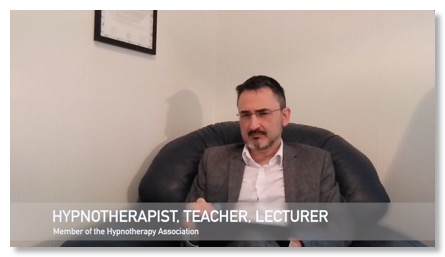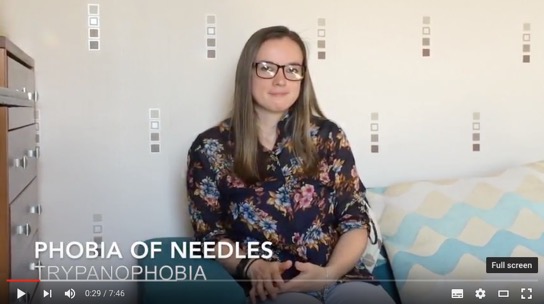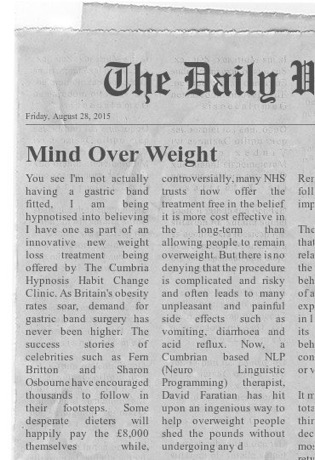What exactly is hypnosis?
21/12/19 12:20 Filed in: Hypnosis

My name is David Faratian. I am a consultant hypnotherapist practising at the Cumbria Hypnosis Mindfulness Clinic and in this article, I would like to explore the fascinating psychology of hypnosis and hypnotherapy and attempt to unravel some of the more common myths. Hypnosis has become well-known thanks to popular acts where people are prompted to perform unusual or ridiculous actions, but, it has also been clinically proven to provide medical and therapeutic benefits, most notably in the reduction of pain and anxiety. It has even been suggested that hypnosis can reduce the symptoms of dementia. When you hear the word hypnotist, what comes to mind?
If you’re like many people, the word may conjure up images of a sinister stage-villain who brings about a hypnotic state by swinging a pocket watch back and forth. While hypnosis is often described as a sleep-like trance state, it is better expressed as a state characterised by focused attention, heightened suggestibility, and vivid fantasies. People in a hypnotic state often seem sleepy and zoned out, but in reality, they are in a state of hyper-awareness. In psychology, hypnosis is sometimes referred to as hypnotherapy and has been used for a number of purposes including the reduction and treatment of pain. Hypnosis is usually performed by a trained therapist who utilises visualisation and verbal repetition to induce a hypnotic state.
So what can hypnotherapy help with? Often hypnotherapy is seen as the magic bullet for dealing with smoking cessation and weight loss. While this is partially true, what people may not always realise is that hypnosis has applications far more far-reaching and effective for a wide range of limiting beliefs, behaviours and emotions, including generalised anxiety disorders, OCD, ADHD, IBS, PTSD, Panic attacks, and even some forms of chronic pain. Often hypnotherapy can be a powerful ally for conventional medical treatments as it empowers self-belief and the ability for the client to heal themselves. Essentially the hypnotherapist acts as a bridge between the issue being dealt with and the part within capable of learning and making changes, namely the subconscious mind. If this brief introduction has piqued your interest and you would like to learn more about how this approach may offer a solution to a long-standing issue which has not been effectively dealt with yet, then find out more by reading the rest of the information on this website.
The power of words in hypnosis part 1

Today we are going to discuss an aspect of hypnosis that most people are probably unaware of. This is the area of language and how it is used in hypnotherapy. The reason why this is so important for the work we do as therapists is because all language is processed and created unconsciously. This is why therapy does not fit into a neat box and it can never be a case of one size fits all, especially when it comes to delivering language to the unconscious of our clients. Therapists who use scripts are merely indulging the 'junk food' of hypnosis. Before you write to me defending the script based approach, let me tell you I used to be exactly in the same school of thought. All that has now changed and here's why.
When we speak we don’t actually know how we produce language we just make various sounds and the words seem to just emerge from our mouths as sentences with meaning. Whenever I initiate a trance in any of my clients I don’t think about what I’m going to say in advance I just seem to ‘know’ what to say. I’m not following a teleprompter I’m not following a pre written script, I’m just saying what comes to mind and letting the ideas ‘flow’, In fact, unless I say something random during a particular train of thought like “butterfly” you will naturally make sense of everything I say to you, because as the subject you are also processing information unconsciously. There is a neuroscience and the neurology going on behind the scenes. This is why language when it comes to hypnotherapy and change work. If the therapist cannot deliver language which evokes a person's own unique representation of their world, then how can he hope to engage with their perceived reality and change it? Language is produced unconsciously, it’s comprehended unconsciously and it’s perceived unconsciously. Language is able to produce powerful hypnotic states, emotional states, deep feeling states. Language can cause us to create pictures in our minds. You only have to think about your favourite novel that you’ve ever read that stimulated your imagination. Why was that? Clearly the language that you were reading was being perceived through your brain as a set of emotional and visual associations and connections which brought the story to life. However, the way you perceive the story is very different from how someone else perceives it based on how they unconsciously process that language. All language is hypnotic, which is why there are certain words and phrases that carry more power than others. In my next blog I will talk about these in more depth.
David Faratian
Hypnotherapy Gives Cancer Survivor Her Life Back

When Melissa Fox was recovering from breast cancer she turned to CancerCare in Barrow for help, not anticipating that it would completely change her life in more ways than one.
Melissa, who lives in Barrow, said the hypnotherapy she received to help her cope with the fact she’d had cancer also helped her to deal with a severe alcohol problem caused by personal problems.
A care worker, mum and grandmother, Melissa, said CancerCare had given her a second chance at life.
She said hypnotherapist, David Faratian, had saved her from self-destruction and helped her to realise that there was a lot to live for.
Melissa, who has been married twice and now lives around the corner from her daughter in Barrow, has recently had the ‘all clear’ from breast cancer following her treatment five years ago.
She said: “I felt fine even during my treatment for breast cancer but I had a lot of anxiety afterwards and, due to some other personal problems, I was drinking too much.
“I had heard about CancerCare and when I spoke to the team they suggested that hypnotherapy might help.”
CancerCare’s Barrow base is at the Trinity Church Centre on Warwick Street near Abbey Road. Free hypnotherapy, counselling, aromatherapy massage and other therapies are available to people affected by cancer.
Melissa, who was 14 years old when she moved from Guisborough in Yorkshire to Barrow with her family, said she didn’t know what to expect from the hypnotherapy sessions.
She said: “It’s not like what you see on TV where the hypnotherapist makes you do different things.
“David taught me various methods for coping with how I was feeling and behaving.
“He helped me to see that I didn’t need to drink to escape from my negative thoughts.
“He also gave me a recording to listen to and help me relax. I’m usually quite hyper but he showed me ways to relax. I saw him six times at his premises at Roa Island and he was very professional.
“We visualised situations where I might have had a drink and he helped me to react differently. Being under hypnosis and visualising situations felt very real.
“Another thing he helped me to realise was that I had recovered from cancer so why would I want to kill myself with drink? It was amazing. It really worked.
“I stopped wanting a drink. Now I can go for days without drinking and if I do it’s just a social drink.
“Being treated by David has made such a difference to my life. I’m not addicted to alcohol now and I don’t want to go back down that road again.”
Melissa attended Alfred Barrow Girls’ School and then Dowdales School in Dalton before leaving to work in various local factories including Blair’s in Dalton and Lister’s in Barrow.
She has a daughter called Hannah who lives close by in Barrow. She has three grandchildren named Dakota, 10, Amaya, 5, and Emelise, 2.
“I see them lots,” said Melissa. “I love them to bits.”
Melissa has a sister called Andrea and two brothers, Martin and Barry. She also had a brother called Anthony who has passed away.
Melissa is surprised and delighted with the success of her hypnotherapy treatment and said she would recommend it to others.
She added: “Life is so much better now.
“I don’t think I would still be here if it wasn’t for David and the hypnotherapy. He’s wonderful!”
David Faratian said: “It has been a privilege working with Melissa and helping her to reach a point in her life where she feels more empowered.
“Hypnotherapy has a very good track record in helping people to deal with any limiting belief, behaviour or emotion they were not born with.
To find out if you would be able to have hypnotherapy through CancerCare please email tct@cancercare.org.uk or call 01524 381 820 and ask for the Therapy CoordinationTeam.
Spider season is approaching!

Practically every year as summer waves goodbye and autumn re introduces itself with a hint of cooling and wetter weather, I can get my calendar out and circle some key dates. What dates you ask? The dates in question are during September and reflect the start of spider season and dates which invariably result in people calling up a service like mine and seeking help for this uninvited ‘terror’. Spiders suddenly seem to be crawling out of the woodwork and terrifying the nations many sufferers. The truth is of course that spiders don’t just appear in autumn and are always present throughout the year but just like anything we give focus to, we are more likely to notice them if we choose to and certainly more because we believe autumn is the worst time for spiders. Unfortunately when we have had a wet summer the chance of noticing these little visitors is more likely but you know that already so what’s the point of my blog?
Spider phobia or as you already know it, arachnophobia, affects 55% of women and 18% of men in the UK. It is a real phobia in the sense that it causes all the symptoms of panic and triggers the freeze, flight and fight response in the sufferer which is hard wired for impending danger and a need to defend oneself from attack. Truth is of course that in our country the number of truly ‘dangerous’ spiders amounts to 0.01 % and even then none of those breeds are found in the typical house spider which is what we are talking about here. When it comes to be scared of spiders our irrational minds, also known as our limbic response builds a picture of the spider being a much bigger entity than it actually is, whether that’s the body, movement, legs, we tend to experience a perception of a creature that belongs more in a 60s horror film rather than reflecting the wholly non threatening insect it actually is. So why is a tiny insect that’s only function is to hide and survive and an insect that certainly has no mission for human domination such a perceived problem. Let's not fool ourselves, spiders are not very attractive and certainly wouldn't win any beauty pageants but they are also not the monster our minds tell us they are. Spider phobia, like most phobias is nine times out of ten born out the unfortunate association we make with them at moment in time, usually childhood when a spider may have caught our eye and caused a spontaneous moment of panic which resulted in the release of the threat hormones cortisol and adrenalin. Now as adults our conscious brains may have forgotten that experience, but since that point when we may have been too young and defenceless to rationalise the startled feelings, we therefore get good at over generalising every future experience which involves an encounter with any spider and those old feelings just reinforce the already negative learning and so the phobia around spiders is born.
But it doesn’t end there. Once a person declares themselves a spider phobic, they begin projecting into the future, creating an anticipation of how they are likely to feel when encountering the next spider even though they haven’t even seen one. In other words, they anticipate anxiety before even having any justification for this belief. Then again, why would they feel any other way. Every single experience in spiders has never been a positive one and they have had no way of rationalising or neutralising these thoughts to create a more positive point of reference and so the phobia seems incurable and debilitating. The end result is more often than not an over anxious person, especially around this time of year, who is constantly on guard and worried. When, God forbid, a person actually encounters a spider then they have to get someone else to remove it or they never enter that room again. This of course is all too common for anyone who identifies with this unfortunate limiting belief.
So can it be dealt with. Can you be spider phobia free, and be cured? The simple answer without any doubt whatsoever is YES. That’s where I come in. Here at the Cumbria Hypnosis Clinic we recognise the fact that spider phobia is a construct of the emotional sub conscious brain. That being the case it is also true that is has been programmed through experience and memory to believe spiders are a threat, therefore the emotional, irrational brain can also be re-programmed through a number of psychological processes to recognise new and more empowering feelings around the encounter, whether in reality or just imagined, with a spider. The sub conscious, responsible for the majority of our independent, thoughts, feelings and emotions can be imprinted with a new set of reference points which teach the individual suffering with the phobia to recognise the thought of a spider is simply not resulting in any anxious feelings, no sense of impending doom and there can even be a sense of feeling more and more relaxed around the very thought of the spider and experience which practically wipes clear the old connection and replaces it with thoughts of confidence and being able to function.
"Since seeing David I have been free from my fear around spiders for more than four years. My husband mentioned it was that time of year again the other day and I hadn't even realised nor was I bothered. Anyone thinking about this, all I can say is give it a go, it worked for me" Jane S (Windermere Cumbria)
What I teach you is set of practical, no nonsense skills, which don’t require any effort, to help develop a sense of independence and confidence around thoughts to do with spiders. This process is highly effective and permanent for more than 85% of the population. If you have been a sufferer or you are currently reading this and want to know more, then please click this link for more information and opportunity to have a free phone consultation. As with every treatment offered by Cumbria Hypnosis I offer the guarantee that if I don’t feel you qualify as one of the 85% then you won’t pay a single penny and so there is absolutely no risk for you if you are not completely sure this is is for you. Remember that any limiting belief you weren’t born with can be changed and removed so why continue suffering…..?
I look forward to being able to explain how I can help you.
Regards
David Faratian (NLP Practitioner and Clinical Hypnotherapist)
Overcoming fear of needles

The fear of needles, whether visiting a dentist or simply needing to give blood is a very common phobia and one rooted in negative childhood experience. Trypanophobia, the technical name for this limiting belief creates the typical fight or flight response around any perception of a needle being used to either inject medication or draw blood. One such sufferer, Molly age 23, a teacher from Barrow recently came to see me about her fear. Molly like so many sufferers had managed to condition her anticipation of anything blood or needle related into an over generalised anxiety. When this happens there is almost a reflex release of adrenalin with the mere thought of the trigger picture, which in turn becomes a learned behaviour. Through a number of layered desensitisation processes Molly was taught how to own the feeling of anxiety instead of resisting it, and thereby helping her to recognise the feeling so that it could be brought under her direct conscious control.
You can learn about Molly's experience with hypnotherapy here. In this interview Molly was happy to explain how the journey she went on with hypnotherapy (EMDR) was seen as a last resort, having tried everything herself beforehand to combat the anxiety through talking and sheer self will, Molly realised she was preventing herself from even visiting a doctor and therefore needed an alternative solution. Hypnotherapy was that solution and as we discover form Molly she was able to notice the benefits of treatment following her first session, and indeed she was noticing changes in attitude toward her anxiety on a weekly basis. The most dramatic revelation that the phobia had essentially been cured was seen first hand when Molly attended her final session. Feeling she was drained of energy Molly asked her doctor for a way to measure her blood glucose levels. Molly was provided with a blood sugar self test kit which she brought to her session. Remembering that a few months previously Molly hadn't even been able to speak about blood or needles, now here she was pricking her finger to draw blood with no signs of anxiety or fear. This demonstrated how powerful an empowered subconscious can be when dealing with any limiting belief. Once Molly had created her new point of reference which gave back her control the phobia essentially broke down at that stage.
The power of hypnosis, as one of the many tools used here at the Cumbria Hypnosis clinic, to deal with any phobia is becoming more and more accepted within the mainstream as an effective treatment for many generalised anxiety disorders. If you have arrived at this page with a general enquiry or a more specific problem then you may be able to find the solution you have been looking on this site. The process for contact is simple. Please fill in the enquiry form by following the following link and request your free callback when you can explain your issue and have a chance to ask any questions which have not been covered in this article. For a full list of treatment follow the link here.
David Faratian
Eliminating fear of heights with hypnosis

Jim from Windermere in Cumbria approached me very recently for his fear of heights. Like so many people with phobias, Jim had an irrational understanding of his problem. Having not been born with this problem, Jim had spent a good part of his life with no issue whatsoever. In fact part of his life had been spent as a fireman and so heights were a natural part of his reality and his experience. Unfortunately this was all to end once he encountered a one off experience which locked itself in as a limiting belief around heights. The detail of the trauma is not as significant as the new reality it created. From that point onwards Jim was able to activate his reticula memory so that every height was generalised as a problem. Through the reframing of his experience with Hypnotherapy Jim was able to not only neutralise and own the feeling rather than run away from it but he was also able to neutralise the spontaneous release of adrenaline associated with the phobia. You can listen to, and watch Jim talk about his experience with hypnotherapy when dealing with his fear of heights. In the interview you can find out about how Jim overcame his fear of heights once and for all and watch him as he demonstrates his new-found confidence.
Some recent photos sent by Jim demonstrating his new found confidence. These photos were taken from the top of Barnard castle. Thank you to Jim for agreeing to share his experience.

If you are struggling with a particular phobia and would like to know how Hypnotherapy may be able to help then click on the following link for more information.
Mindfulness the new anti-depressant

So what exactly is mindfulness? One my client’s from Kendal recently asked me what was the ‘big deal’ about mindfulness? There's a great deal of buzz and interest at the moment about this word, especially in education and conventional medicine. So here it is - In its simplest terms, mindfulness is about being present in the moment while you calmly reflect on your feelings and thoughts and bodily sensations as you experience them in the here and now without forcing them or resisting them in any way. When you can be fully present, without resisting or trying to shy away from your feelings and emotions, then you start to create a space around you which allows you to take hold more effectively of the situations you face and the choices you make. Life is full of challenges, but when we are mindful we are better able to work with our minds and bodies so that we can deal with our life’s anxieties and stresses far more effectively.
Trying to be mindful on a day-to-day basis does require a certain amount of learning and patience, but once you learn to be mindful the new perspective which you can get on your life can be fundamentally life changing. The reason mindfulness is being accepted more and more within conventional medicine is because it is seen as one of the many psychological tools that can be equally if not more effective than embarking on a course of medication as prescribed by most general practitioners. Many of my referrals from GPs are directly related to mindfulness training.
Mindfulness is not new either. With its origins in Buddhism, it has been around for thousands of years, only recently however being accepted by Western health care. The reason I mention it here, is because hypnotherapy, and all the techniques which are utilised here at the Cumbria Hypnosis Clinic have their roots in mindfulness practices. For over a decade now, the mindfulness therapy which I have been using has helped hundreds of people to deal with their everyday stresses, panic attacks, and anxiety disorders, as well as dealing with more general negative behaviours like smoking and gambling.
“Once I learned the self hypnosis techniques (mindfulness techniques) shown to me by David, I have been able to sleep better, I have a much better appetite, and things just don’t get to me as easily” Paul Carter (Penrith, Cumbria)
The great news is that anyone can learn how to become skilful in mindfulness, children, teenagers and adults alike can benefit from this simple yet life changing practice. Although there are many different ways you can develop your ability to be more mindful, the most effective way to become more knowledgeable is by being trained on a one-to-one basis with a trained mindfulness teacher. My experience with mindfulness extends over a period of 10 years. Not only do I use mindfulness within my hypnotherapy clinic with all my clients on a daily basis, but I have also taught children and other practitioners how to use the most cutting edge mindfulness strategies to help overcome any limiting belief or behaviour.
If you would like an opportunity to discuss your mindfulness goals with me then you can contact me directly by clicking on this link.
Have a peaceful day
David Faratian
Anger in the workplace
04/04/16 12:07 Filed in: Anger hypnosis

Recently one of my male clients who we will refer to as Graham from Windermere in Cumbria approached the Cumbria hypnosis habit change clinic for help with his anger. Anger management refers to the techniques that people can use to control their feelings of extreme emotion and how they use these techniques to avoid situations which can trigger anger in certain situations and with certain people.
Unfortunately for Graham he was being challenged by his frustration around the behaviour of some of his work colleagues. The problem with anger management in the workplace is that negative behaviours can very quickly threaten not only important relationships but also can threaten the very livelihood of the person suffering with the anger issues. Generally speaking, problems with anger in the workplace are dealt with directly through the employer by sending the individual concerned to an anger management class. Through these classes, and with most anger management therapy, the individual is trained how to identify the triggers, and at the same time given strategies to neutralise the trigger. Indeed hypnotherapy and the coaching that we offer here at the cumbria hypnosis clinic can successfully teach an individual how to deal with these unproductive feelings, and to control the reactions at a subconscious level which can lead to more healthy responses rather than reactions. With the exclusive methods which we teach here at the clinic you are taught to rid yourself of the in a cause of unwanted anger. This method is powerful and the complete system and can be used to get the most successful outcome out of any situation involving anger. Hypnosis and hypnotherapy can give the tools necessary so that you can express your emotions in a healthier and safer way thereby avoiding unnecessary conflict and damaging outcomes whether in personal relationships, in work scenarios, or simply in terms of the self inflicted stress that anger can cause.
Since treatment, Graham has felt empowered so that his anger no longer feels like an automatic response over which he has no control. In his own words;
“At times all I could see was red and from that point onwards anything could happen. It really scared me. David has told me how there is no point resisting the emotion and through his strategies I have learnt to bring the emotion immediately under my control before it has chance to take over. What’s great about this therapy is that I don’t need to really try to calm down now it’s just the way I am. Since seeing David I am sleeping better and feel I have far more energy to channel into my life.”
With our clinic helping people across Cumbria, including Windermere with flexible appointment hours, this service may have and answer to your problem with anger. Follow this link for more information about the service OR click here to request your free 20 minute consultation.
Mind Over Weight

Recently one of my clients, Claire from Ulverston in Cumbria came to see me for her years of struggle with her attempts to lose weight. She had literally tried everything she could think of and like so many people had spent hundreds of pounds searching for her holy grail. She had attempted numerous diets, traditional and a few unconventional ones which she had found on Facebook and the internet but each and every attempt had resulted in the same outcome which was short term weight loss and a sense of optimism followed very quickly by an abject sense of feeling dismayed and disheartened: “I felt like a complete failure and just went straight back to eating again, putting all the weight back on again” Claire is not alone, however. Her story, like 90% of people worldwide is one of failure to lose weight with diets long term. Why is it so hard? The answer is pretty simple really. The body was not designed to be starved. When you put your body into a famine all you end up doing is stressing the system and the body kicks in to recovery mode. What this means is that once you starve yourself the body makes you feel more hungry, more irritable and more focused on the foods you shouldn’t be thinking about rather than anything else, which then compels you to grab the first opportunity to eat as much as possible thereby undoing all of the work you may have already put in. The body will keep this up until the balance is restored and the ‘emergency’ of no food is over.
And yet the dieting industry which is worth billions of dollars happily pedals the false dream of the perfect body as long as you keep trying again and again. The perfect business model for the big name weight loss companies, which I don’t even have to mention, but not necessarily the perfect solution for those they sell to. Diets are artificial, they are boring and they are unsustainable long term. This is our starting point in this discussion. So is it a lost cause? Is the idea of controlling your weight the impossible dream? Well, yes and no. You see if you are always comparing yourself to the airbrushed models in Vogue or Cosmopolitan then you are setting yourself an unrealistic challenge to become something which doesn’t even really exist. If however you can condition yourself to be happy with a balanced and healthy body, where you are simply comfortable and happy in your own skin then very quickly your resistance around what you think you should and shouldn’t eat can become less important. If you can accept and understand that food is merely a function of your life and NOT the be all and end all then you can relax more and live with less stress about your body.
So if you don’t achieve weight loss through dieting then how do you do it? The clients I work with learn to control three key areas of their lives, which once dealt with help reshape their entire philosophy around food so that they cannot only control the weight but more importantly can learn to lose weight naturally without sacrificing anything in their lives. Claire told me “ This was like nothing I had ever done in the past, because at no point did I feel like I was having to give up anything or having to use will power”. What Claire had identified was the one main difference between experiences with diets and the gastric band hypnosis process which I teach. In diets you have to choose what you can and cannot eat. With gastric band hypnotherapy, using a variety of cutting edge mental strategies you do not need any effort or willpower because our starting point is that food will always be around you therefore why fight it? You can try denying yourself but you will always want the thing you are trying to avoid so just stop resisting and realise your environment will not change BUT you can! Once food doesn’t tempt you in quite the same way, your behaviour based on your emotions will start changing. The autopilot of the body also known as the subconscious can readily train your ability to know when you are full and can be trained to feel full quicker. Claire’s experience illustrates this: “ I had always known that gastric band operations existed, but I didn’t want to put my body through dangerous surgery and I certainly wasn’t willing to spend £8000. Once I was shown how to achieve similar results using hypnosis, I was amazed at how quickly I was feeling full and how much more food was left on my plate” Once you can have more subconscious awareness of feeling full quicker with less food then through sustained automatic balanced eating, the body begins to more efficiently process burning off existing fat and preserving less new fat. The metabolism can, in effect, return to normal and function more efficiently, doing its job properly after having maybe spent years speeding up and slowing down according to any yo-yo dieting attempts.
“I would recommend this service (Cumbria Hypnosis Habit Change Clinic) to anyone who is struggling with diets. It Takes all the effort out of losing weight, gives you confidence and enables you to live your life to fullest without sacrificing anything.” Louise (Barrow-in-Furness)
The mind and body working in balance can result in dramatic and long lasting weight loss, once you have been able to engage with the creative part of brain. The reason why this approach works, is simply because it does not rely on resisting your environment and yourself, instead it is about reframing your perceptions of food and how much you actually need to eat to have the energy you need to get from one mealtime to the next without running back to the fridge an hour later. If you want to find out more then visit our dedicated page HERE
Cumbria Hypnosis serves Cumbria, South Lakes including Ulverston, Kendal and Lancaster with flexible daytime and evening clinics to suit you. If you would like to have a no obligation 20 minute consultation where I will share exactly how this process can help you then you can contact me by clicking this link
Wishing you well
David Faratian
Gambling your life away
19/01/16 14:25 Filed in: gambling


A few weeks ago one of my clients, John (name changed) from Kendal in Cumbria came to see me about his problem with gambling. This gentleman was suffering from a life which had been destroyed by his inability to look beyond his infrequent wins. He was completely addicted to the idea of horse racing (real and virtual) and over the course of a number of years had managed to lose over £50,000. This was clearly a serious problem for him. Not only had it ruined him financially but it had also taken away his life socially and personally. His inability to walk past the temptation of maybe being able to ‘win this time’ had meant that he was alienating him self from every relationship and was even being stopped from seeing his own children because the relationship with his partner had broken down to such an extent. The desperation on this man's face was clear when he first came to see me. Attending gambling anonymous had not helped and simply talking about it in some kind of counselling context had been equally ineffective. What could be done?
John’s problem is very common indeed and in fact affects over 40% of the adult population based on data as recent as 2014. With any addict the problem is always associated with the emotional feelings created by an artificial release of a powerful hormone into the system called dopamine. The problem with dopamine is that once it gets into your system and gives you that thrill feeling you require twice as much next time to get to the same level you experienced the first time. It is the surge of excitement associated with the initial thrill which leads to the need for gambling strengthening and eventually becoming addictive. Unfortunately once someone is addicted, then the priorities in a person’s life shift and person can become isolated and detached to the point where they are unable to see clearly or make rational judgements.
Through the treatment I was able to offer John we were able to disassociate him from the emotions that he felt around the idea of winning a particular horse race and therefore neutralising the release of dopamine. In effect there was no longer any thrill associated with the idea of winning so therefore the thought of gambling very quickly lost its interest. This approach is highly effective for this particular addiction if the person can engage with the creative process. Hypnotherapy and hypnosis as well as a combination of other psychological tools like neurolinguistic programming are powerful when it comes to dealing with limiting behaviours like gambling because they make the shift back to rational thinking effortless and automatic. Thankfully ‘John’ is now in a much better place and is managing to his life back on track, looking forward to making this a very positive year (2016 at the time of writing this blog). This was what he had to report recently.....
“ I have my head sorted out with thanks to yourself, am in a good place and think about things in a different perspective, to what I use to, am am busy taking my father for his treatment at this present moment in time, thanks for all your help if I ever need you I will be in touch, and I will highly recommend you to people, thanks again “
With a decade of experience The Cumbria Hypnosis habit change clinic serves the entire Cumbria and South lakes region, including Kendal and Lancaster. If you would like to find out more about the power of hypnotherapy to deal with an addiction like gambling then click HERE to be redirected to our dedicated page.
The power of the human mind
Please picture an iceberg and now imagine that the iceberg is submerged and all that you can see is the very top of it. The rest of that huge bulk lies deep below the water. Well, if you were now to imagine that the bit that you can see above the water approximately 10% represents the part of your mind that you use during an entire lifetime, while the bit below that huge roughly 90% is the part of your brain that never gets used, then you’ll understand how we are not only underutilising our very own ‘supercomputer’ but just consider the potential of the mind which many people miss out on. In the words of author James Allen “ You are today where your thoughts have brought you; you will be tomorrow where your thoughts take you”
So what if you could harness that potential no matter how old or young and literally master your mind to achieve some quite amazing things, which may at first seem impossible and certainly untreatable from a conventional medical point of view. Would that be of interest?
In the blog that now follows, over coming weeks and months, I hope to be able to share with you just how powerful the mind really is and what you can personally achieve once you are open to the possibilities for change. My intention is not to baffle you with science nor do I wish to make any extreme claims about the subject matter to follow. What I do hope is to de-mystify the myth about all things to do with the mind, mind control and hypnosis. The media has understandably stirred a subconscious interest in mind power, from psychological illusionists like Derren Brown to hypnotherapists like Paul McKenna and even more recently from magicians like Dynamo, that enigmatic blend of science and the paranormal is intuitively appealing to even the most skeptical. It is far more interesting to be challenged by the unexplainable than to simply have that experience handed to your understanding on a silver platter; it’s just how we are built.
I hope that the reader finds the information interesting, educational and certainly helpful in what it may open up in terms of opportunities for personal development. I will begin as from next week exploring how the mind can be used for faster and more effective learning by discussing the fascinating subject of accelerated learning and memory, so whether you are an emerging student or a more mature learner looking to maximize your brain’s potential you may just wish to ‘tune in’ next time. Let the journey into mastering your mind begin.
Accelerated Learning
It is true to say that the mind can be viewed as an iceberg and throughout our lifetimes we never really use the full potential of our mind’s capacity. The brain, being a supercomputer is capable of making infinite connections per second and is vastly superior to any man made computer available to date.
Why is it then that so many of us would argue that we have a poor mind or poor memory and that we are forgetful. Consider this situation, and it has happened to most people – you wander into a room and suddenly can’t remember why you came there? Maybe you put down your keys or phone and return to the exact place where you would have sworn you left them and yet they are not there. We struggle with names and faces and we can’t even remember something as simple as an eight-digit pin number, let alone recall what we ate for lunch a few days ago.
The reason is that from a very early age we never train our minds to think the way the brain likes to learn best. The brain retains and process information not in words and abstract grammar but in pictures. They say a picture can speak a thousand words and that is exactly why because pictures communicate in the brain’s language. Imagine your favourite car or consider describing your ideal partner. Are you seeing those descriptions in words or in pictures? Do you dream in words? Of course not, the mind can only relate to pictures and symbols. Knowing this helps us to accelerate our potential beyond the normal 10% and develop a far sharper memory and ability to learn and retain new information more efficiently.
Accelerated learning is like putting your brain on turbo-power and one of the first things you can learn is how to reduce information into more symbolic form. Let me give you an example. Here are 10 words you can try memorising – WALLET – SNAKE – PEACHES – SCREW DRIVER – DRUM – BOOK – PIANO – GOAT – MIRROR – TANK. Now look away from the list and note down the list the best you can remember it. The chances are that you may remember a few of the words but almost certainly you will struggle with whole list, and if I was to ask you from memory to recall the list backwards you would think I were mad. With accelerated learning you can learn to not only recall the entire list, but you can also learn 100 words just as easily…and say them backwards!
The key is to use the pictures in your mind in a creative way to make strong connections. But that is only part of the story because next you must learn to access the most receptive mode for learning known as the Alpha state. Studies into brain frequencies show that when the mind is relaxed then it learns without any distraction. This alpha state or learning state can be generated, by learning self-hypnosis or meditation so that in effect the mind turns into a laser, pin pointing and retaining far more information. In some educational facilities, students listen to relaxing music, ideally classical to encourage this learning state. This is known as the Mozart effect. Indeed not only is the student more able to learn new information but can also recall that information to achieve better grades on average up to one grade higher than they otherwise might.
Other methods for stimulating better recall include the use of vivid colours to encode information more prominently on the memory. Where colours, creative symbols and imagination through association are all combined together, the learner creates a powerful combination.
In my next blog entry I will share how to memorise that list of ten words so that you never forget them and I will also show you a powerful exercise for entering the alpha state.
So how do we accelerate learning above and beyond the normal level which as we have already discovered accounts for ten percent of what the brain is really capable of. How do we ensure that the memory becomes sharper and retains information more long term?
In my last blog I explained that information decays very quickly if it isn’t encoded in a way that makes it ‘stick’ or makes it stand out to our conscious awareness. The secret lies very simply in how we process information. The adage ‘A picture speaks a thousand words’ is that secret. Once you can encode any information in pictures you can capture vast amounts of information very quickly and always know how to access that information weeks and even months later. Most pictures we see don’t stick though because if they did then they would fill up the brain’s ‘hard drive’ pretty quickly. That is why we forget most peoples’ names and we might find it difficult to recall any information, which is mundane or doesn’t excite our attention. If I asked you to think of a picture that would stick in your head for the rest of your life however, you would probably have no problem at all recalling what happened on September the 11th 2001 and yet would probably have no clue as to what you were doing on September 17th 2003, unless of course that date had a special meaning for you in your life. So what makes information stick?
It is simple really. Anything that evokes emotion in us or peaks our attention because it is illogical, funny, violent, colourful or rude tends to be very memorable. That is why cartoons are more memorable than a long poem. Knowing this allows us to channel our learning using these basic principals. Take information you want to learn and then turn it into a picture, which is memorable using some of the principals outlined. In its simplest form the picture must be associated with something illogical or extreme and then connected to a piece of information which is already familiar. There are well-documented techniques for associating information for better memory and recall but my favourite is called the ‘Loci’ method, which relies on associating pictures with familiar locations such as the rooms in your home.
Start by taking a mental journey through your home. Maybe begin in your bedroom and then imagine walking through to your bathroom and then find the toilet and move onto another room, which isn’t your initial room. Imagine walking down the stairs and walking into the room closest to the street then move into the room further back and then the kitchen. Finally study the back door and then walk into the garden or area behind your home. You now have 10 locations where you can potentially place any information you choose.
Now I have to stress this is simplistic but the concept is the same for any information, no matter how detailed, you wish to recall. Take the list we looked at last time WALLET-SNAKE-PEACHES-SCREW DRIVER-DRUM-BOOK-PIANO-GOAT-MIRROR-TANK. The list is irrelevant but the concept of memorising the list is very relevant.


Start off again in your bedroom and now connect the word ‘Wallet’ with your bedroom in an illogical, funny, colourful or extreme way. Maybe e a huge gigantic leather wallet stuffed with fifty pound notes right in the middle of your bedroom. The second location was bathroom so we now connect the second word ‘snake’ to that location. Remember to make the picture stick by making it fit something out of the norm. So in this case we might imagine walking into the bathroom and being horrified to see a giant snake wrapped around the shower-head and seeing the bath full of snakes (Sorry if you have a fear of snakes!) Proceed to the next location, which was ‘toilet’ and make a funny connection with ‘peaches’. Maybe see loads of juicy peaches filling your toilet and spilling over the sides. Proceed through the entire list and connect each word to a location. The moment you revisit each location you will find the word pops into your mind as a picture. What do you remember in your bedroom? What could you see in the bathroom, and what about the toilet, yes those peaches! You get the idea?
Just for fun try memorising a shopping list of ten items and connect them to the ten locations. Once you have achieved ten why not extend your locations to twenty or even more. One memory expert uses the very same concept to remember the order of 10 packs of 52 playing cards after having seen them only once using exactly the same principle.
This literally is the tip of the iceberg when it comes to memory and accelerated learning. If you have enjoyed this then please visit my page www.facebook.com/cumbriahypnotherapy and LIKE, SUBSCRIBE and FOLLOW. If you would like to know more I am always available to answer questions so please private message me again via my page.
Why is it then that so many of us would argue that we have a poor mind or poor memory and that we are forgetful. Consider this situation, and it has happened to most people – you wander into a room and suddenly can’t remember why you came there? Maybe you put down your keys or phone and return to the exact place where you would have sworn you left them and yet they are not there. We struggle with names and faces and we can’t even remember something as simple as an eight-digit pin number, let alone recall what we ate for lunch a few days ago.
The reason is that from a very early age we never train our minds to think the way the brain likes to learn best. The brain retains and process information not in words and abstract grammar but in pictures. They say a picture can speak a thousand words and that is exactly why because pictures communicate in the brain’s language. Imagine your favourite car or consider describing your ideal partner. Are you seeing those descriptions in words or in pictures? Do you dream in words? Of course not, the mind can only relate to pictures and symbols. Knowing this helps us to accelerate our potential beyond the normal 10% and develop a far sharper memory and ability to learn and retain new information more efficiently.
Accelerated learning is like putting your brain on turbo-power and one of the first things you can learn is how to reduce information into more symbolic form. Let me give you an example. Here are 10 words you can try memorising – WALLET – SNAKE – PEACHES – SCREW DRIVER – DRUM – BOOK – PIANO – GOAT – MIRROR – TANK. Now look away from the list and note down the list the best you can remember it. The chances are that you may remember a few of the words but almost certainly you will struggle with whole list, and if I was to ask you from memory to recall the list backwards you would think I were mad. With accelerated learning you can learn to not only recall the entire list, but you can also learn 100 words just as easily…and say them backwards!
The key is to use the pictures in your mind in a creative way to make strong connections. But that is only part of the story because next you must learn to access the most receptive mode for learning known as the Alpha state. Studies into brain frequencies show that when the mind is relaxed then it learns without any distraction. This alpha state or learning state can be generated, by learning self-hypnosis or meditation so that in effect the mind turns into a laser, pin pointing and retaining far more information. In some educational facilities, students listen to relaxing music, ideally classical to encourage this learning state. This is known as the Mozart effect. Indeed not only is the student more able to learn new information but can also recall that information to achieve better grades on average up to one grade higher than they otherwise might.
Other methods for stimulating better recall include the use of vivid colours to encode information more prominently on the memory. Where colours, creative symbols and imagination through association are all combined together, the learner creates a powerful combination.
In my next blog entry I will share how to memorise that list of ten words so that you never forget them and I will also show you a powerful exercise for entering the alpha state.
So how do we accelerate learning above and beyond the normal level which as we have already discovered accounts for ten percent of what the brain is really capable of. How do we ensure that the memory becomes sharper and retains information more long term?
In my last blog I explained that information decays very quickly if it isn’t encoded in a way that makes it ‘stick’ or makes it stand out to our conscious awareness. The secret lies very simply in how we process information. The adage ‘A picture speaks a thousand words’ is that secret. Once you can encode any information in pictures you can capture vast amounts of information very quickly and always know how to access that information weeks and even months later. Most pictures we see don’t stick though because if they did then they would fill up the brain’s ‘hard drive’ pretty quickly. That is why we forget most peoples’ names and we might find it difficult to recall any information, which is mundane or doesn’t excite our attention. If I asked you to think of a picture that would stick in your head for the rest of your life however, you would probably have no problem at all recalling what happened on September the 11th 2001 and yet would probably have no clue as to what you were doing on September 17th 2003, unless of course that date had a special meaning for you in your life. So what makes information stick?
It is simple really. Anything that evokes emotion in us or peaks our attention because it is illogical, funny, violent, colourful or rude tends to be very memorable. That is why cartoons are more memorable than a long poem. Knowing this allows us to channel our learning using these basic principals. Take information you want to learn and then turn it into a picture, which is memorable using some of the principals outlined. In its simplest form the picture must be associated with something illogical or extreme and then connected to a piece of information which is already familiar. There are well-documented techniques for associating information for better memory and recall but my favourite is called the ‘Loci’ method, which relies on associating pictures with familiar locations such as the rooms in your home.
Start by taking a mental journey through your home. Maybe begin in your bedroom and then imagine walking through to your bathroom and then find the toilet and move onto another room, which isn’t your initial room. Imagine walking down the stairs and walking into the room closest to the street then move into the room further back and then the kitchen. Finally study the back door and then walk into the garden or area behind your home. You now have 10 locations where you can potentially place any information you choose.
Now I have to stress this is simplistic but the concept is the same for any information, no matter how detailed, you wish to recall. Take the list we looked at last time WALLET-SNAKE-PEACHES-SCREW DRIVER-DRUM-BOOK-PIANO-GOAT-MIRROR-TANK. The list is irrelevant but the concept of memorising the list is very relevant.


Start off again in your bedroom and now connect the word ‘Wallet’ with your bedroom in an illogical, funny, colourful or extreme way. Maybe e a huge gigantic leather wallet stuffed with fifty pound notes right in the middle of your bedroom. The second location was bathroom so we now connect the second word ‘snake’ to that location. Remember to make the picture stick by making it fit something out of the norm. So in this case we might imagine walking into the bathroom and being horrified to see a giant snake wrapped around the shower-head and seeing the bath full of snakes (Sorry if you have a fear of snakes!) Proceed to the next location, which was ‘toilet’ and make a funny connection with ‘peaches’. Maybe see loads of juicy peaches filling your toilet and spilling over the sides. Proceed through the entire list and connect each word to a location. The moment you revisit each location you will find the word pops into your mind as a picture. What do you remember in your bedroom? What could you see in the bathroom, and what about the toilet, yes those peaches! You get the idea?
Just for fun try memorising a shopping list of ten items and connect them to the ten locations. Once you have achieved ten why not extend your locations to twenty or even more. One memory expert uses the very same concept to remember the order of 10 packs of 52 playing cards after having seen them only once using exactly the same principle.
This literally is the tip of the iceberg when it comes to memory and accelerated learning. If you have enjoyed this then please visit my page www.facebook.com/cumbriahypnotherapy and LIKE, SUBSCRIBE and FOLLOW. If you would like to know more I am always available to answer questions so please private message me again via my page.
Colour spinning
22/07/13 14:42 Filed in: Self-Hypnosis | NLP
Colour Spinning – Keeping your emotions under control
One of the most paralysing and worrying emotions people face throughout their careers is that of fear borne out of self doubt about a particular situation and its potential outcome. What NLP teaches us is that often this ‘fear’ is nothing more than an illusion, a construct of our own imaginations, and since this is the case, there is no better ally in dealing with this type of emotion than the imagination itself. The self talk that constantly unsettles and deceives us before we have even faced a particular situation can be damaging and unnecessary but herein lies the beauty of NLP in its simplicity to change perspective and quickly neutralise these negative feelings.
With the following technique you must first establish mentally what the problem you might be facing is. Then with your eyes closed try to imagine experiencing that situation as clearly as your imagination will allow. Try to ‘see’ ‘hear’ and ‘feel’ and bring as much clarity to the imagined situation as you can. Where do you experience this feeling most? Usually people will identify the anxiety of a perceived challenge as starting somewhere below their solar plexus. Now, can you identify which way that feeling moves? In other words, it is rare that when you feel anxiety that it will simply habituate in one place, and it is far more likely that the feeling will rotate somehow and usually that feeling will be like a churning upward feeling. If this is the case try to imagine this ‘churning’ feeling as a colour. The colour itself could be any colour you wish, although contrast will be important for this exercise so try to choose a colour you associate with ‘negative’. Now with your eyes closed and using the breathing techniques which are explained in this book, imagine pulling this churning , rotating colour ring out of your stomach, flipping it over and giving it another more ‘positive’ colour. As you do this, make sure you spin the new colour ring in the opposite direction so that instead of it churning upwards and round it will instead be perceived as spinning in the opposite direction. Finally bring the new rotating ring back inside your chest and breathe more calmly.
If you have done this as explained then you should notice a dramatic reduction in anxiety. Of course reading about the process and doing the exercise are very different so make sure you actually give the exercise a go. At cumbria hypnosis we show you how to use similar stratgies to self empower and negate unnecessary paralyzing emotion.
One of the most paralysing and worrying emotions people face throughout their careers is that of fear borne out of self doubt about a particular situation and its potential outcome. What NLP teaches us is that often this ‘fear’ is nothing more than an illusion, a construct of our own imaginations, and since this is the case, there is no better ally in dealing with this type of emotion than the imagination itself. The self talk that constantly unsettles and deceives us before we have even faced a particular situation can be damaging and unnecessary but herein lies the beauty of NLP in its simplicity to change perspective and quickly neutralise these negative feelings.
With the following technique you must first establish mentally what the problem you might be facing is. Then with your eyes closed try to imagine experiencing that situation as clearly as your imagination will allow. Try to ‘see’ ‘hear’ and ‘feel’ and bring as much clarity to the imagined situation as you can. Where do you experience this feeling most? Usually people will identify the anxiety of a perceived challenge as starting somewhere below their solar plexus. Now, can you identify which way that feeling moves? In other words, it is rare that when you feel anxiety that it will simply habituate in one place, and it is far more likely that the feeling will rotate somehow and usually that feeling will be like a churning upward feeling. If this is the case try to imagine this ‘churning’ feeling as a colour. The colour itself could be any colour you wish, although contrast will be important for this exercise so try to choose a colour you associate with ‘negative’. Now with your eyes closed and using the breathing techniques which are explained in this book, imagine pulling this churning , rotating colour ring out of your stomach, flipping it over and giving it another more ‘positive’ colour. As you do this, make sure you spin the new colour ring in the opposite direction so that instead of it churning upwards and round it will instead be perceived as spinning in the opposite direction. Finally bring the new rotating ring back inside your chest and breathe more calmly.
If you have done this as explained then you should notice a dramatic reduction in anxiety. Of course reading about the process and doing the exercise are very different so make sure you actually give the exercise a go. At cumbria hypnosis we show you how to use similar stratgies to self empower and negate unnecessary paralyzing emotion.
Eliminating Fear
A variation on same theme as colour spinning is called the ‘swish’ method. With this technique you learn to literally ‘swish’ the problem from a negative one into a more positive one. This technique is slightly more complex because it requires you to go through a number of stages to reach the final desired effect but by following the guidance carefully you should learn to master this powerful approach quickly and easily.
So let’s begin. Firstly it is important to find a quiet space where you won’t be disturbed for at least fifteen to twenty minutes. Make sure your mobile phone is switched to silent and ensure you have a comfortable place to sit. I always say ‘sit’ because with this kind of exercise there is the danger that once you enter a reflective, meditative state you could easily fall asleep if you happen to be lying down. Now consider a situation where you were strong and sure of yourself. This need not be related to a current memory, just any scenario where you felt good about yourself, your achievements and your emotions were more than positive. Now try to imagine this as vividly as you possibly can. See colours, hear sounds and feel your emotions as if you were there right now.
Next try imagining pushing that scene off to the right. Use your imagination and push the picture you just created off to the right. In front of you create a new picture. This one should be the current challenging situation you are facing. ‘See’ this scene with equal clarity as the previous one. Now here is the trick – You must now imagine this image getting gradually smaller, duller, and with less colour. The image must gradually fade and become smaller and smaller. At same time take the positive experience which is waiting over to the right and literally ‘swish’ it very quickly right in front of the fading image and make it completely mask and overshadow the negative experience. Make the image bright, colourful and bigger than before. Now immerse yourself once more in this positive experience. What you should find is that your immediate challenge is now reduced. Repeat this process as many times as you need to.


